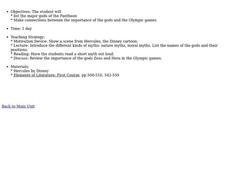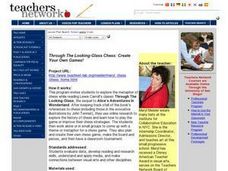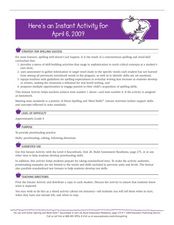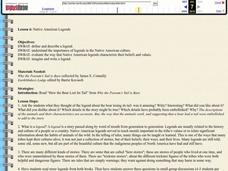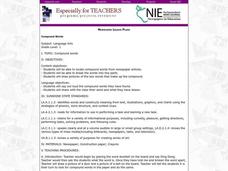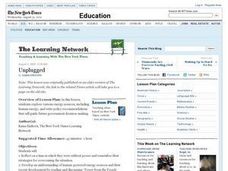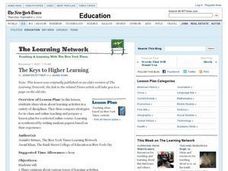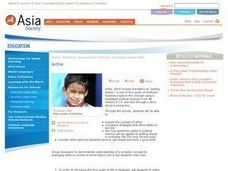Curated OER
How Many Ice Creams?
Young scholars discuss their favorite ice cream flavors and read the math problem. They brainstorm the problem and brainstorm for ways to solve the problem. Students work in pairs and share solutions.
Curated OER
Mythology
Learners gain an understanding of different myths and the names of Pantheon gods and their names. They read short myths out loud and review how Zeus and Hera were important to the Olympic games.
Curated OER
Through the Looking-Glass Chess: Create Your Own Games!
Sixth graders research chess in relation to the metaphors in Lewis Carroll's Through the Looking-Glass. They read the novel and note references to chess and research the history of chess and how to play the game. In groups, they create...
Curated OER
The American
Students engage in the study of "The American" by Henry James. They read the novel and watch the film to create the context for a variety of activities. Students conduct research about the novel and the author using different resources.
Curated OER
Sum It Up!
Students practice summarizing information from a reading using their own words. They take notes while reading using a guided worksheet. For the written summary they have a budget of two dollars with each word used costing ten cents.
Curated OER
Virginia Woolf: A Room of One's Own - Shakespeare's Sister
Students, after reading and analyzing, "A Room of One's Own," by Virginia Woolf, analyze how creating and defending one's position as well as how narrative functions as a rhetorical device. They evaluate and focus in on Shakespeare's...
Curated OER
Should Your Hairstyle Be A Constitutional Right?
Students examine the 1st and 14th Amendments of the U.S. Constitution. In this U.S. government lesson, students read the Amendments and interpret them in order to respond to essential questions regarding constitutional rights.
Curated OER
Spelling Success: correct spelling
Fourth graders circle the word in each row that is spelled correctly. In this spelling lesson plan, 4th graders read four words in each row and circle the correct one.
Curated OER
Native American Legends
Students create a "legend" about an animal. In this Native American legends lesson, students define the purpose and importance of Native American legends. Students read "Why the Possum's Tail is Bare" and "Earthmaker's Lodge"...
Curated OER
"Be the Kiwi"- Whale Rider
Students discuss examples of foreshadowing and find information about the Maori culture in Whale Rider. For this Whale Rider lesson, students define foreshadowing and find examples. Students evaluate whether or...
Curated OER
Compound Words
First graders read newspaper articles and locate compound words. They break the words into two parts, then draw pictures of the two words.
Curated OER
Recognizing a Message's Point of View
Students study the physical, mental, and social health benefits of regular exercise while attempting to recognize the point of view of media messages. They read an article and discern ways in which they can make regular exercise a part...
Curated OER
"Study Finds Soft Drink Consumption Up, Health Down"
Young scholars compare the nutrients in soda with those in milk after reading an online article. They identify micronutrients that are important in the teen years and those that help stave off disease.
Curated OER
Unplugged
Students read the article "Power From the People Breaks the Hold of Batteries and Plugs." Students work in groups to examine various sources of power. Students debate the advantages and disadvantages of each power source. They assume the...
Curated OER
People of the Plains:Music and Dance
Fourth graders are given a worksheet stating the goal of the day, different sections to visit, and time spent on each section. They are given the CDs, 4th graders are told to insert the CDs into the computer. Students go to The Plains...
Curated OER
Hop Scotch
Students practice a variety of techniques and strategies to assess the letter sound of o=/o/. They encounter Elkonin Boxes to assist them with their task as well as the tongue twister "Oliver had an operation in October, and Oscar gave...
Curated OER
Discover the World of Machines
Students participate in a project which incorporates science with reading, writing, social studies, and technology. Through several activities over a 15 day period, they explore the computer, digital camera, computer software programs...
Curated OER
You Are Here
Students simulate a course with and without a guide as if they were an airplane with and without air traffic control. They read and discuss the article "For Airlines, Hands-On Air Traffic Control". They discuss challenges that air...
Curated OER
Writer's Workshop: Mood Endings
Students listen to a story, "My Mama Had A Dancing Heart." They discuss the feeling they had after reading the story and define "mood." Students brainstorm a list of moods and discuss the mood of each character. Afterward, they write a...
Curated OER
The Keys To Higher Learning
Students discuss the validity of using the internet for learning. They compare and contrast the various strategies for learning when done online and in class. Students prepare a lesson plan for an online class and write a paper...
Curated OER
Artha
Students explore the concept of artha. For this Hinduism lesson, students read, "Seven Ways to Greet a Neighbor," and "Eight Rupees." Students discuss artha in light of the readings completed as part of the lesson.
Curated OER
Temperance Alphabet
Students research the Temperance Movement and create a persuasive project. In this Temperance/Prohibition Movement lesson, students research online and discuss the arguments for the movement. Students read a pamphlet and create an...
Curated OER
Mary Shelley's Frankenstein
Students complete close reading and analysis activities for Mary Shelley's Frankenstein. In this literature analysis lesson, students complete multiple close reading and analysis activities to evaluate the 19th century story.
Curated OER
Newspapers or Television: What's Better?
Students compare newspapers to television news and decide which they prefer. In this newspaper and television lesson, students read an article and watch a video of the same event. Students discuss the differences, forming an...

